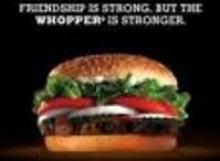To de-friend or not to de-friend, that is the question.
When I recently de-friended some of my Facebook friends, it was not for a free hamburger as inthe case when Burger King offered Facebookers a free burger for de-friending ten friends. According the NYT, about 234,000 friends were de-friended for a free hamburger. Burger King has since dis-continued this nifty little application, but at the time sent out notifications to the de-friended explaining the reasons for the de-friending. I can understand being traded in for a taco, but a burger? I might be a little offended at this.
In my career as a Facebooker, I have accepted many Facebook friend invitations for less than altruistic motives. I had to know if the ex-cheerleaders from my high school would be fat and was itching for the inside gossip on how many kids the school's resident "town pump" (for lack of a better word) had? And where, oh, where, were my former classmates vacationing? What kind of jobs did the brainiacs have now? (One of my classmates is now a tri-athlete/mom/Neuro-Researcher at Stanford.)
My interest in these people that I hadn't seen in almost 20 years faded away in less than three weeks. OK, I was relieved and a little excited to know that about half of the cheerleaders got fat, but he "town pump" not surprisingly, was not on Facebook, and if the others knew what she was up to, it definitely wasn't showing up in their Facebook status.
The majority of my former classmates seemed to be living really, boring lives. I liked Lori all right in high school, but did I really need to know that she was making macaroni and cheese for dinner? Was Beth's strange pilmigrage to Forks, Washington to see the home of "Twilight" (which is just about the dumbest book I've ever read) really worth re-living through her photos? Did I really care that Jennifer, who I supposedly went to elementary school with, but do not remember, was probably "Marilyn Monroe" in a past life? I decided to make a purge.
As I de-friended people, I started to think about the ramifications for my actions. Would my former "friends" (mostly people that I was definitely not friends with in "real time") take some kind of Facebook revenge on me? Would my South African Christian friend feel badly about my de-friending her? (something that became absolutely necessary as the Christian messages and Facebook statuses became a little overwhelming for my non-Christian mind.)
In a column dedicated to the etiquette of Facebook, Slate writer Rehein Salom gives advice for a special Facebook de-friending situation of the worst kind:
But what if your so-called friend scans through their friend list and notices that you've gone missing? First off, anyone who is policing their Facebook account this rigorously is morbidly obsessed and thus best kept at arm's length. If she confronts you about it, the best strategy is to plead ignorance: Perhaps the site's massive growth has led to some unexpected technical difficulties? Re-friend, then wait at least six months before trying another de-friending.
To me, this seemed like a Mickey Mouse band aid that wouldn't really workall all that well on such an insidious problem. Finally, I did the unthinkable- I left Facebook altogether. Unfortunatley, as Facebook was my primary method of communication with many of my friends, I started to realize that in order to stay in touch with many of the people I'd met traveling, I'd have to re-join. My brief stint as a non-Facebooker lasted all of four days.
I was missed, though. Re-joining led to a host of messages about where I'd been, and the fear that I would be somehow be caught out for de-friending 27 "friends" permanently. It's been about two months since I made the great purge, and I haven't been called on it yet, but I'm thinking I'll just tell anyone feisty enough to track me down and harrass me about the de-friending, I will simply tell them I did it for a free taco.
